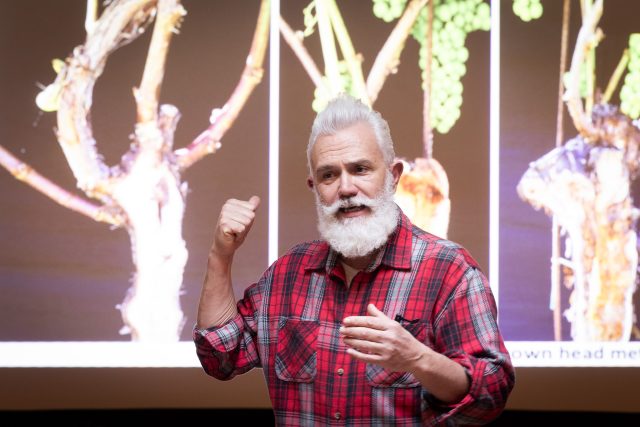This website uses cookies so that we can provide you with the best user experience possible. Cookie information is stored in your browser and performs functions such as recognising you when you return to our website and helping our team to understand which sections of the website you find most interesting and useful.
Advice from ‘pruning guru’ could transform the world’s vines
“Soft pruning” pioneer Marco Simonit claims his technique can not only boost the global bank of prized old vines, but also tackle fungal disease and other key issues caused by climate change.

Since setting up his consultancy Simonit & Sirch in 1998, Italy’s Marco Simonit has built a client base that includes Bordeaux estates Yquem and Latour, Champagne’s Louis Roederer, Domaine Leflaive in Burgundy, Muga in Spain, Biondi-Santi in Italy and Cathy Corison in California.
“Pruning is one of the most invasive actions with the most impact on the health of the vines,” Simonit argued in a seminar at the Arlberg Weinberg festival held in the Austrian ski resort of Lech recently.
“A big cut, a big wound is not good for the vine; it doesn’t matter which training system you have.”
At the heart of Simonit’s soft pruning technique is what he calls “the dynamic evolution of the architecture of the vine in time and space.”
In practice this involves improving vascular flow by pruning only one side of a branch and, instead of cutting flush against the main branch, leaving a distance roughly twice the diameter of the shoot.
It is this smaller offshoot that carries the wound, thereby protecting the main body of the plant.
Hydraulic sap
“The sap flow inside is like a hydraulic,” outlined Simonit. “The way of the sap flow is strangled by the dead wood.”
If vineyard managers can improve sap flow, he argued, they can mitigate the problems caused in many regions by drought.
“Where there is less water available for the plant, for me the solution is not only more water, more inputs, but to increase the efficiency of the water,” Simonit explained.
Likewise, in regions where rising temperatures cause issues with sunburnt grapes, Simonit outlined how his technique can “design a new plant architecture to improve canopy management.”
With fungal diseases such as esca on the rise in regions including Bordeaux and Burgundy, Simonit argued that by minimising damage to the vine, his pruning technique helps to tackle this pressing problem.
“The only way the fungi can get into the structure of the vine is through the wounds,” he observed.
Simonit acknowledged that his services tend to be employed mainly by high-end producers.
“I like to find good connections between good terroir, the vine and wine, then try to work for longevity, resilience,” he explained. “This kind of work needs time.”
However, Simonit stressed that any producer prepared to invest the time in soft pruning can benefit from its results.
In particular, he noted: “I love the biodynamic approach but you can help your vines to become older even if you are conventional.”
Pruning Academy
During the pandemic, Simonit channelled his energy into reaching a wider audience via an online course, the Simonit & Sirch Vine Master Pruners Academy.
In addition, he recently unveiled prototype Augmented Reality glasses, which use AI to help workers in the field.
Above all, Simonit stressed the value of investing time and manpower in vineyard management. Pointing to a widespread industry reliance on irregular migrant labour, he remarked: “Every year it changes. They come one season but not the next; they come for winter pruning but not for shoot selection. I suggest investing more time in the vineyard. Build a standard operating procedure and teach these guys.”
However, Simonit accompanied this advice with a warning that “there doesn’t exist a recipe.”
He stressed the importance of individual producers adapting his technique to their specific site and grape varieties, even if “it is often easier to import a solution than to wait, take time and make observations in your own house.”
For larger producers, suggested Simonit, this close connection with the vineyard can be particularly challenging to achieve.
“The spirit of the vigneron is to observe and learn, but you need to spend time, to follow the process,” he remarked.
“When your business grows you need to go to the cellar, to visit countries around the world, and so the focus goes.”

